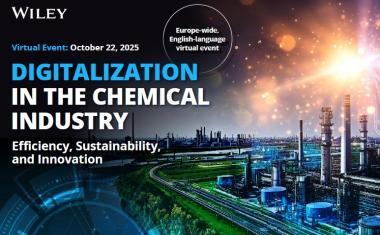
Intelligent Flow Diagrams for the Digital Future
Inventory, significance and solutions for the process and chemical industry

Inventory, significance and solutions for the process and chemical industry

Strong Supply Chains, Efficiency, Digitalization, and Talent Development are Crucial for Chemical Distributors

Dunia Innovations Merges AI and Robotics to Accelerate Real-World Materials Discovery

How AI and Robotics are reshaping the race for materials discovery.

Discover how digitalization is revolutionizing energy and resource efficiency in plant operation in the chemical industry.

The award winner will receive access to Merck's technologies and expertise to expand its AI-based genome editing platform.

Build an AI-ready Data Strategy to Drive Faster Insights, Smarter R&D, and Measurable ROI.

Cutting Time and Cost of Developing Sustainable Products with AI-Powered Solutions

Dutch start-up Mavisol has developed an innovative machine vision and AI solution designed specifically for plastic converters, with the aim of promoting environmental sustainability and improving material reuse efficiency.

John Banovetz, Chief Technology Officer at 3M, on the role of digital transformation in realizing the company's goals.

In 2024, the chemical distribution industry is at a pivotal moment, navigating both challenges and new opportunities. As distributors grapple with a landscape shaped by shifting global trade routes, demand constraints, and digital disruption, their roles are evolving far beyond traditional bulk breaking.

Artificial intelligence (AI) has made groundbreaking progress in recent years, particularly through innovations in machine learning and neural networks. These developments are largely driven by deep learning technologies, which enable the recognition of complex data patterns and the achievement of human-like performance in areas such as speech recognition, image processing, and decision-making.

SABIC recently announced the official launch of its new US$170 (€157.7) million ultem resin manufacturing facility in Singapore, marking the company’s first advanced specialty chemical manufacturing facility in the region producing the high-performance thermoplastic, ultem resin.

In collaboration with Shell, COAC has implemented the Smart Equipment Passport (SEP), a solution to create digital identities of equipment that can be used to exchange information with internal and external users safely and securely.

Egrobots, a start-up from Egypt, developed a solution for efficient farm monitoring and management using AI and robotics. Their innovation includes an autonomous robot, that roams around the farm, scanning the plants on a leaf-level with high resolution and an AI that analyses this data.

Artificial intelligence (AI) can help companies in the process industry capture, retain and access valuable historical expertise and ease the transition for new colleagues in the plant.

Generative AI can impact the field of chromatography in various innovative ways. However, great care needs to be taken to validate any use of this emerging technology from a technical, quality and regulatory perspective.

The logistics industry urgently needs digital transformation to ensure quality and to tackle challenges such as the shortage of skilled workers and sustainability.

Partex Group, an AI-driven drug discovery company, today announces a collaboration with global pharmaceutical company Sanofi, aimed at using Partex’s AI technology to enhance the value of Sanofi's out-licensing portfolio.

Iktos, a French company specialized in artificial intelligence (AI) for new drug design, and Bayer’s Crop Science division announced a collaboration to expand the use of AI in the discovery and development of new sustainable crop protection products.

Process manufacturing companies waste almost $100 billion globally every year while formulating novel materials and chemicals due to the trial-and-error approach to R&D and the lack of tools to leverage the experimental data in real-time.

Manual experiment monitoring and data capture is still the status quo in most biotech and pharma labs, compromising efficiency and project timescales. But there is a better way.

The Spanish computational chemistry start-up Nextmol (Bytelab Solutions), a spin-off from the Barcelona Supercomputing Centre, offers a software-as-a-service (SaaS) platform that accelerates research and innovation in sustainable specialty chemicals through “in silico” experiments using molecular modeling and artificial intelligence (AI).

The 7th edition of the CPHI Annual Survey was unveiled today highlighting trends for 2024. A total of 250 pharmaceutical executives were surveyed with 35 probing questions, with their answers informing the industry landscape for the next year, spanning all major pharma markets.

Nanoform, a nanoparticle medical technology company, has awarded AstraZeneca a global online STARMAP license. STARMAP is an AI-based digital rendition of CESS technology, facilitating in-silico experiments for selecting molecules to be nanoformed. This license enables AstraZeneca to screen molecules during the entire drug development process.

AI and analytics software company SAS is collaborating with global biopharmaceutical company AstraZeneca to increase efficiency and drive automation in the delivery of statistical analyses for clinical and post-approval submissions to regulatory authorities.

Many life science companies generate large swathes of data.

As a global specialty chemicals company, Altana develops innovative technologies, solutions, and products with a clear customer focus. The company aims to strengthen and expand this position in the long term. The topic of digital transformation plays a key role.

As a global specialty chemicals company, Altana develops innovative technologies, solutions, and products with a clear customer focus. The company aims to strengthen and expand this position in the long term. The topic of digital transformation plays a key role.

As it continues to leverage earnings from its top-selling mRNA-based Covid vaccine to deepen its existing knowhow, Mainz, Germany-based BioNtech has announced plans to acquire all of London-based artificial intelligence specialist InstaDeep.

French pharma Sanofi has entered a multi-year, multi-target research collaboration worth up to $1.2 billion with Hong Kong biotech Insilico Medicine.

Artificial intelligence (AI) has become one of the supporting pillars for digitalization in many areas of the business world. The pharmaceutical industry and its GxP-regulated areas also want to use AI in a beneficial way, but only a small fraction of companies follows a systematic approach for the digitalization of their operations and validation. However, the assurance of integrity and quality of outputs via computerized system validation is essential for applications in GxP environments.


Interview with Joachim Haupt and Florian Kaiser, PharmAI

French drugmaker Sanofi is taking an equity stake worth $180 million in and entering a new strategic collaboration with artificial intelligence (AI) and precision medicine specialist Owkin.





















